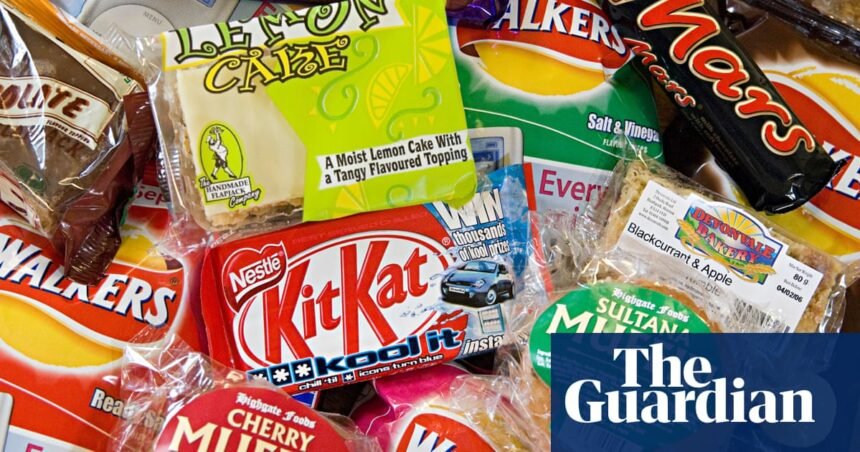Dozens of health and children’s groups have urged ministers to tackle obesity by taxing foods with too much salt or sugar.
They claim the new tax, based on the sugar tax on soft drinks, will force food manufacturers to reformulate their products to make it easier for consumers to eat healthier.
Thirty-five groups made their request in a letter to Finance Minister Rachel Reeves and Health Minister Wes Streeting. Signatories include groups representing the UK’s doctors, dentists and public health chiefs, health charities including Diabetes UK and the World Cancer Research Fund, as well as senior figures in chef Jamie Oliver’s organisation.
Health groups believe a tax on unhealthy food such as cakes, sweets, biscuits, crisps and salty snacks would bring billions of pounds in revenue to the Treasury and reduce the number of people falling ill from poor diets.
Polls show that two-thirds of British people support taxing such products as long as the revenue is used for children’s health.
YouGov’s representative survey of 4,943 British adults, commissioned by food campaigners Recipes for Change, also found:
-
74% believe food companies are dishonest about the health effects of their products.
-
61% of people are concerned about the amount of sugar and saturated fat in the food they eat.
-
Only 13% believe that without government intervention, producers would improve the nutritional value of food.
-
72% are concerned about the high level of processing used in food production.
Reeves announced in last week’s budget that the Treasury was studying whether the sugar tax that comes into effect in 2018 should be extended to other very sweet products, including milkshakes and high-sugar coffee. It was generally considered a success.
Anna Taylor, chief executive of the Food Foundation, who also signed the letter, said: “The damage the food industry causes to children’s health is the greatest threat to our nation’s well-being and future productivity, and it needs to be urgently curbed.
“The government must now be bolder and create real incentives to force the industry to align further and faster with public health goals.”
The idea of a new “salt and sugar reformulation tax” was first proposed in the 2021 government-commissioned National Food Strategy drafted by Henry Dimbleby, co-founder of the Leon restaurant chain.
In recent months, the House of Lords Food, Diet and Obesity Committee, the Institute for Public Policy Research (IPPR) and the British Heart Foundation have all expressed support for a food tax.
Health groups want ministers to start tightening regulations on the food industry. They say relying on the industry to voluntarily clean up its act from a nutritional perspective, as the previous Conservative government did between 2010-24, does not lead to meaningful change.
“The voluntary reformulation scheme of sugar, salt and calories has not proven to be sufficiently effective, achieving only a 3.5% reduction in sugar content across key product categories compared to the mandatory soft drinks industry levy (sugar tax), which had achieved Reduction in total sugar content.
Only 34% of global sales of the world’s 30 largest food and beverage companies come from more nutritious and “healthier” products, according to a report released Thursday.
70% of Danone’s, 65% of Barilla’s and 58% of Ara’s sales come from such products, while only 38% of Coca-Cola’s sales come from such products, and the proportions of Kraft Heinz (35%), Nestlé (33%) and Mars lower.
Findings compiled by the Netherlands-based nonprofit Nutrition Access Initiative show that despite calls from health organizations and governments to reformulate, manufacturers have generally made little progress in improving the nutritional quality of their products.
IPPR senior researcher Jamie O’Halloran said: “Without bold regulatory reform, our food system will continue to fail to promote healthy lifestyles, especially for the lowest income groups.
“Expanding the tax to cover other high-sugar and ultra-processed products could be transformative, particularly if the resulting revenue is used to support healthy food choices for low-income households.”
The Food and Drink Federation says manufacturers are already making their products healthier. “The company has made significant progress in creating healthier options for shoppers. As a result, our members’ products now contribute 25% less sugar, 24% fewer calories and less salt to the UK grocery market compared to 2015. increased by 33% and provided an additional 190 million servings of fiber.”
A government spokesman said: “Obesity is a major health challenge, affecting 26% of adults and costing the NHS £11.8 billion every year.
“The Budget takes action to ensure the soft drinks industry levy maintains its drive to encourage healthier soft drinks and we will publish a 10-year health plan in spring 2025.”

